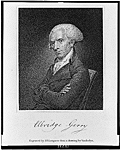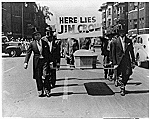Posted on March 2, 2000
The Voting Rights Hoax
Racial scaremongers collide
by
Daniel Clark
While trying to out-pander Vice President Gore at Al Sharpton's Apollo Follies, Senator Bradley warned that, "It is very important to make the Voting Rights Act permanent so that the right to vote will never be endangered for African-Americans." This proclamation was based on a vicious internet hoax, which any former legislator should know better than to believe.
The rumor Bradley is helping to spread is based on the 1965 Voting Rights Act, the most recent revision of which was signed by President Reagan in 1982. The hoax presumes that Reagan, being a Republican, must have had something sinister in mind. Therefore, by signing the bill, he was actually setting a ticking time bomb. In the year 2007, the bill expires, at which time blacks' voting rights would supposedly be revoked. In order to reinstate them, the story goes, 38 states would have to ratify them all over again, just as if a new amendment were required.
It's not surprising that this tale has found an audience on left-wing talk radio, but for Bill Bradley, a former senator who obsesses over racial issues, to be so ignorant of the legislation involved defies credibility.
The law which recognized the right of black men to vote is the Fifteenth Amendment, ratified in 1870. (Women, of course, had to wait for passage of the Nineteenth Amendment, fifty years later.) Constitutional amendments do not expire: to repeal black people's voting rights, it would take a two-thirds majority vote in Congress, and ratification by more than three-fourths of the states. Anyone who believes that this is going to happen will be casting his next vote in a rubber booth.
The Voting Rights Act, a set of guidelines for the Justice Department's enforcement of the Fifteenth Amendment, was designed to prevent Jim Crow era abuses, the most egregious of which, poll taxes and bogus literacy tests, had already been banned a year earlier by the 24th Amendment and the Civil Rights Act, respectively. The Voting Rights Act is of secondary importance at best, and was intended to be a temporary measure from the outset. Nevertheless, both parties have every intention of renewing it once again in 2007. The only arguments will be over which sections are revised, and how.
In 1997, South Carolina Democrat James Clyburn, then the chairman of the Congressional Black Caucus, tried to dispel the hoax, by explaining that nobody's voting rights were endangered. It was important that he do that, because he wants to amend the Voting Rights Act in such a way that would allow the sort of racial gerrymandering that was struck down by the Supreme Court in the mid-nineties.
In its current state, the act contains language which says that no right exists to racially proportional representation. This means that the law has no compelling interest in bringing the percentage of minority representation in Congress into congruity with the population at large. It is Clyburn's contention that the removal of that language will lead the Court to assume the opposite, and unconditionally accept race-conscious districting, even when it does not comply with traditional guidelines regarding compactness and contiguity. He can't achieve this, however, if minority voters are terrified that any tinkering with the act is a threat to their right to vote.
When trying to persuade the perpetrators of the voting rights scare to join his cause, Rep. Clyburn generously assumed pure motives on their behalf, suggesting that, "Perhaps the same good intentions that have waged the current misinformed campaign can be diverted into an effort to fight dilution of minority power achieved since the original implementation of the Voting Rights Act." (Translation: "Racial demagogues of America, get with the program.") They didn't listen, of course. It's now three years later, and the voting rights hoax has returned with a vengeance.
Inadvertently, the hoax has exposed the true danger that faces our electoral process when the Voting Rights Act comes up for review in 2007. That threat is the segregation of the electorate, based on the assumption that people with the same skin color think alike, and cannot be adequately represented by a person of a different color.
In its 1995 report, Reaffirmation or Requiem for the Voting Rights Act?, the American Civil Liberties Union viewed racial gerrymandering as the very aim of voting rights legislation. Indeed, the ACLU, living up to its usual standards of accuracy and objectivity, referred to critics of gerrymandering as "opponents of voting rights."
The practice of gerrymandering was started as a way of consolidating voters from one party in a small number of districts, in order to maximize the number of districts in which the other party has a majority. In 1812, Massachusetts governor Elbridge Gerry approved a redistricting plan that, in its zeal to round up a large number of opposing voters in a single district, created a new district so awkward in shape that a political cartoonist likened it to a salamander. He drew a pair of eyes on it and -- presto -- the Gerrymander was born.

In order to prevent the spawning of other such creatures, Congress passed the Reapportionment Act in 1842. It was this law which created the standard, which still applies today, that congressional electoral districts must be compact and contiguous. The racially gerrymandered districts created in North Carolina and Texas were neither, as is obvious to anyone who has seen them, and were therefore rejected by the Supreme Court.
It was North Carolina's 12th district which drew the sharpest criticism. The state legislature had sent its redistricting plan to the U.S. Department of Justice for approval, in compliance with the Voting Rights Act, but the DOJ rejected it for only containing one majority-minority district. Having been ordered to create a second such district, the legislature picked out small pockets of minority population across the state, and linked them together with long segments of uninhabited intrastate. The result was a district far less compact and contiguous than anything Gov. Gerry ever imagined. Rather than a salamander, it resembled a snake, in the process of digesting numerous unsuspecting mice. Rep. Clyburn hopes that the alterations he would make to the Voting Rights Act would actually compel the creation of such districts, in spite of Supreme Court precedent and the Reapportionment Act.
In the section of its report entitled "Race-Conscious Districting: Why It's Needed, Why It Works", the ACLU asserts that "In the long run, this remedial strategy has been shown to break down racial boundaries." The dominant theme of the report is that "a race-based problem requires a race-based solution." Guided by that philosophy, it happily concluded with the obviously contradictory proposal that we can break down racial boundaries by constructing racial boundaries.

If increasing minority representation in the House is so high a calling that it justifies race-conscious districting, then the Senate, whose members are chosen in statewide elections, should require the reconfiguration of state borders. Then, of course, there is the Presidency, which is, and always has been, occupied by a representative who is 100 percent white, and 0 percent black. That's even less proportionally representative than Congress. What are the ACLU and the Congressional Black Caucus to do?
Once the idea is accepted that voters can only be adequately represented by a member of their own race, blacks, comprising thirteen percent of the population, have been handed a losing proposition. If the interests of citizens of different colors are as separate and as entrenched as the ACLU presumes, then the will of the minority will be thwarted at every turn. It seems that the logical conclusion would be for blacks and other minorities to secede from the United States.
Fortunately, nobody really believes any of that, except, maybe, for the kooks who have been pushing the voting rights hoax. Proponents of race-conscious districting don't necessarily care about the color of the representatives it would produce. It's just that they've made the calculation that, since most blacks are Democrats, they could create more Democrat districts through racial gerrymandering.
Don't believe it? Imagine that citizens reflexively vote for candidates of the same color, the way the ACLU says. Imagine, also, that a congressional race in a majority-minority district pits a black conservative Republican against a white liberal Democrat, and that therefore the district elects the Republican. Does anybody believe that the ACLU or the Congressional Black Caucus would call that "progress"?
Those who peddle gerrymandering as an interracial remedy are perpetrating a hoax more subtle and intelligent than the one Sen. Bradley is pitching, but no less a hoax. In order to increase their own numbers in Congress, the Democrats are seeking to impose a form of segregation, and they are doing it in the name of civil rights.
In the midst of a hapless presidential race, Bradley seems flummoxed that all of his race-baiting has failed to win him his party's support, but it's only because he has been using amateur tactics. He says he's in the fourth quarter of his campaign, but the game's outcome was decided long ago. Soon, he will return to the bench, where he will learn to be a better demagogue by watching the pros in action.
The Shinbone: The Frontier of the Free Press
Mailbag . Issue Index . Politimals